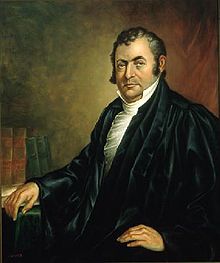Robert Trimble
| Robert Trimble | |
|---|---|
 |
|
| Associate Justice of the Supreme Court of the United States | |
|
In office May 9, 1826 – August 25, 1828 |
|
| Nominated by | John Quincy Adams |
| Preceded by | Thomas Todd |
| Succeeded by | John McLean |
| Judge of the United States District Court for the District of Kentucky | |
|
In office January 31, 1817 – May 9, 1826 |
|
| Nominated by | James Madison |
| Preceded by | Harry Innes |
| Succeeded by | John Boyle |
| Personal details | |
| Born |
November 17, 1776 Berkeley County, Virginia, U.S. (now West Virginia) |
| Died | August 25, 1828 (aged 51) Paris, Kentucky, U.S. |
| Political party | Democratic-Republican |
| Spouse(s) | Nancy Timberlake |
| Religion | Presbyterianism |
Robert Trimble (November 17, 1776 – August 25, 1828) was an attorney, judge, and a justice of the United States Supreme Court.
Trimble was born in Berkeley County, Virginia, to William Trimble and Mary McMillan. His family moved to Kentucky when he was three years old. They settled in the area outside Boonesboro (now Clark County).
Trimble's opportunities for early education were sparse, but he studied what material was available and taught school for a few years. He studied law at a new law school in Lebanon, Ohio. He also read law under George Nicholas until Nicholas' death in 1799, then continued his studies under future Louisiana Senator James Brown. He was licensed to practice law by the Kentucky Court of Appeals in 1803 and commenced practice in Paris, Kentucky.
Trimble married Nancy Timberlake and the two had at least six children.
In 1803, Trimble was elected to represent Bourbon County in the Kentucky House of Representatives. During his single term in the legislature, he found that he disliked the life of a politician, and thereafter refused election to any public office, including two nominations to the U.S. Senate.
In 1808, Trimble was commissioned as an associate justice on the Kentucky Court of Appeals, where he was a colleague of future U.S. Attorney General Felix Grundy. He was offered elevation to chief justice of the court in 1810, but declined because his financial situation dictated that he return to his legal practice.
...
Wikipedia
